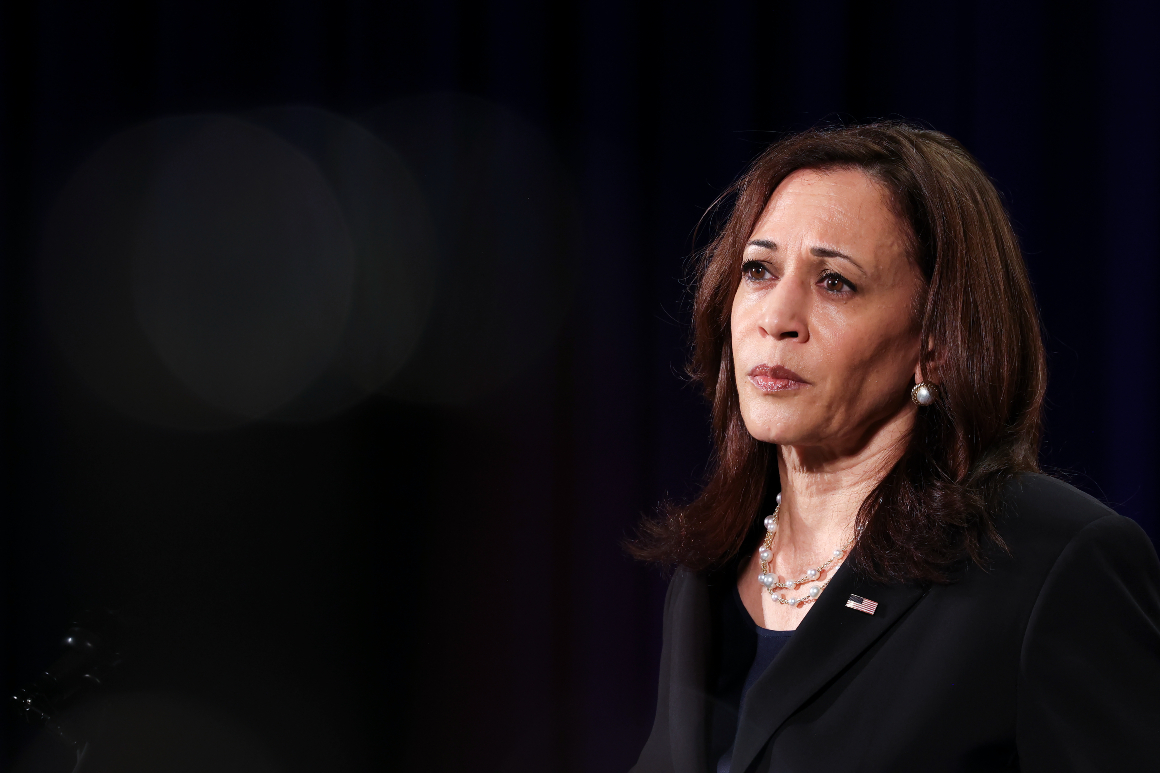Kamala Harris is facing backlash from some of President Biden’s supporters after excerpts from her upcoming memoir surfaced this week. In her book, Harris blames Democrats for being “reckless” in leaving the party’s nomination to Biden.
The former vice president has been navigating a delicate political landscape since losing to President Trump in 2024. Earlier this summer, she announced she would not run for California governor in 2026. At the time, she said her future lies “outside elected office,” at least for now.
Despite this, Harris used her memoir to frame her political setbacks as the result of party mismanagement rather than her own campaign strategy.
Memoir Excerpts Raise Eyebrows
In a section of the book published by The Atlantic, Harris wrote:
“The stakes were simply too high. This wasn’t a choice that should have been left to an individual’s ego, an individual’s ambition. It should have been more than a personal decision.”
Many former White House staffers interpreted this as a veiled critique of President Biden and the party’s handling of the 2024 campaign.
“No one wants to hear your pity party,” a former staffer told Politico anonymously. The comments reflect frustration among Democrats who felt Harris’s critiques should have been shared privately, rather than publicly.
Another former aide added:
“I hate that we’re beating up on a man struggling with cancer, and [who] did genuinely serve our country pretty damn well, even if he made a critical error at the end. But maybe what is even more painful is that we needed more of this distinction and acknowledgement during the campaign. … I’m most offended by this being too little, too late.”
Questions About Timing
The timing of Harris’s memoir has also raised eyebrows. One former Biden aide asked:
“Why didn’t she do this during the campaign?”
Harris had campaigned vigorously for Biden in 2024. Yet, in the memoir, she portrays him as “growing tired” as the race progressed. She also recently described him as “very much alive” in an earlier interview, a comment that puzzled some political observers.
Many Democratic insiders argued that Harris’s public reflections should have remained behind closed doors. The party is still struggling to regroup after the 2024 election, and airing internal disputes now could complicate future strategy.
Harris’s Perspective
A source close to Harris insists the memoir is not intended as a public attack on Biden. Instead, it is meant to provide candid insight into her experiences during the campaign.
“She set out to be candid in this book, whether that’s her genuine struggles with how to balance her loyal relationship with President Biden with tough political realities, or reflecting on her own missteps on the campaign trail,” the source said.
The source emphasized that Harris is also open about her own errors, not just party mistakes.
Biden’s Withdrawal and Harris’s Rise
President Biden dropped out of the 2024 race after a poor debate performance against Trump in June 2024. He did so at the urging of top Democratic political figures and media personalities.
Immediately after withdrawing, Biden endorsed Harris as his successor. This endorsement effectively bypassed the need for a primary at the Democratic National Convention.
While the move elevated Harris in the short term, some strategists argue it complicated her political standing. By becoming the presumptive nominee without a primary, Harris faced expectations that she struggled to meet.
Carville’s Candid Advice
Longtime Democratic strategist James Carville recently offered blunt advice regarding Harris and her allies. He said the Democratic Party wants to move on from anyone closely associated with the 2024 campaign.
“Don’t be terrified,” Carville said on his podcast. “She wisely chose not to run for governor of California.”
He added:
“Anybody that had anything to do with 2024, the party wants to move on from that. This isn’t anybody’s fault.”
Carville also referenced Minnesota Governor Tim Walz, noting that Democrats are unlikely to embrace political figures tied to 2024.
“If I were your friend, if I were your chief advisor, I’m doing this not from a personal standpoint, but because this is not going to be the environment where Democrats look to anybody connected to the 2024 campaign,” he said.
Staff Reactions to Memoir Claims
Several former staffers have expressed disappointment that Harris’s memoir did not address internal issues during the campaign more transparently. They argue that airing grievances now is too late to help the party.
Some staffers were particularly frustrated by Harris’s critique of Biden’s stamina and energy during the race. They felt it contradicted her prior public support and could be interpreted as undermining the former president.
Others noted that Harris’s comments reflect a broader trend in politics: politicians framing their losses as the fault of others.
“It’s a classic move,” one former aide said. “You redirect blame and avoid self-reflection. In this case, it’s public and very transparent.”
Public Perception and Media Coverage
The excerpts from Harris’s memoir have ignited discussion in media circles. Conservative outlets highlight the criticism of Biden, while progressive publications emphasize Harris’s attempts at candor.
Social media reactions have been mixed. Some users praise Harris for being honest about her campaign experience. Others criticize her for publicly questioning party decisions and leadership.
The memoir is expected to become a focal point in the political discourse leading up to the 2026 election cycle, even though Harris announced she will not run for governor.
Harris’s Future Plans
Despite the controversy, Harris is positioning herself for a potential political return, though not immediately. Her decision to sit out the 2026 California gubernatorial race indicates a focus on rebuilding her personal brand and influence within the Democratic Party.
Analysts note that memoirs often serve dual purposes: personal reflection and political signaling. Harris’s candid tone may be an attempt to recalibrate her image after a challenging election cycle.
“She wants to be seen as independent, reflective, and capable of leadership,” one political commentator said. “The memoir is her platform to communicate that outside the constraints of office.”
The Memoir’s Broader Implications
Harris’s book highlights internal Democratic tensions post-2024. Party officials are balancing the need for unity with the airing of criticisms from high-profile figures.
Her memoir underscores how political narratives can shape public perception. By framing her losses as party mismanagement, Harris attempts to control the story of her political career.
However, critics argue this strategy may backfire. By publicly criticizing party decisions, Harris risks alienating key allies and donors who remain sensitive about the 2024 election.
Strategic Takeaways
Several lessons emerge from the Harris memoir controversy:
-
Timing Matters: Public reflections after an election can influence party unity and voter perception.
-
Transparency vs. Loyalty: Balancing candor with allegiance is a challenge for political figures.
-
Media Amplification: Memoir excerpts are often magnified by media coverage and social media reactions.
-
Long-Term Positioning: Politicians may use books to lay groundwork for future campaigns, even if they are currently outside elected office.
Conclusion
Kamala Harris’s upcoming memoir has sparked debate among Democrats, former aides, and political strategists. Her critique of party decisions and Biden’s campaign management highlights tensions within the Democratic Party.
While some view her statements as an honest reflection, others see them as poorly timed and self-serving. The memoir serves both as a personal account and a political signal, hinting at how Harris may navigate her career in the coming years.
Her candid remarks remind Democrats that post-election reflection can be a double-edged sword, offering insight but also stirring controversy.
As the party looks toward 2026 and beyond, Harris’s memoir will likely influence discussions about leadership, loyalty, and accountability within Democratic circles.

James Jenkins is a celebrated Pulitzer Prize-winning author whose work has reshaped the way readers think about social justice and human rights in America. Raised in Atlanta, Georgia, James grew up in a community that instilled in him both resilience and a strong sense of responsibility toward others. After studying political science and creative writing at Howard University, he worked as a journalist covering civil rights issues before dedicating himself fully to fiction. His novels are known for their sharp, empathetic portraits of marginalized communities and for weaving personal stories with broader political realities. Jenkins’s breakout novel, Shadows of Freedom, won national acclaim for its unflinching look at systemic inequality, while his more recent works explore themes of identity, resilience, and the fight for dignity in the face of oppression. Beyond his novels, James is an active public speaker, lecturing at universities and participating in nonprofit initiatives that support literacy and community empowerment. He believes that storytelling is a way to preserve history and inspire change. When not writing, James enjoys jazz music, mentoring young writers, and traveling with his family to explore cultures and stories around the world.









